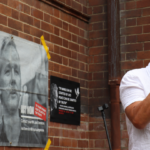With Boyle Next Up, It’s Time for Labor to Walk Its Talk on Whistleblowers

Not only were locals taken aback when lawyer David McBride was given such a severe prison sentence last week, close to six years inside for leaking information that exposed war crimes, but the global press appeared shocked that Australia was locking up the famed whistleblower at all.
The gaoling of McBride finally brings an end to the spectre that federal Labor, and indeed, attorney general Mark Dreyfus, had been conjuring over the last years of the decade that party had found itself in opposition, which was the ruse about doing good by whistleblowers when in office.
To feign a whistleblower-saviour complex as Dreyfus did in his last years in opposition was to side with their supporters, like the Alliance Against Political Prosecutions, and more particularly, to show a willingness to assist with three key whistleblower prosecutions, with McBride’s being one.
But the imprisonment of McBride, which prior to any appeal sees him unable to seek parole for two years and three months, is only the latest instalment of a sideshow that’s seen the AG release a non-whistleblower and then continue to fry the two public servants who spoke out about corruption.
And this spectacle isn’t over. Once the disbelief over McBride’s fate wears off, the realisation is ATO whistleblower Richard Boyle remains the last discloser on the hit list, and just as David hardly deserved years inside, no one wants the man who stopped illegal tax practices being sent away.
Synchronised legislating
Boyle blew the whistle on the Australian Taxation Office, when he took the story to the press in mid-2018. But he only did this after first going to his seniors with the issue, which was an illegally applied debt collecting practice that’s since been ceased, and he then went to an independent watchdog.
In fact, Boyle knew the correct steps to take in blowing the whistle, as he was following the rules set out in the Public Interest Disclosure Act 2013 (Cth) (PID Act), which is the federal legislation designed to protect those disclosing corrupt practices in the public service.
In October 2021, amid the furore over the prosecutions against McBride, Boyle and Witness K and his lawyer Bernard Collaery, Dreyfus told the press that the protection framework in the PID Act was “not a perfect scheme” and he committed to making “necessary improvements” when in office.
Dreyfus drafted the laws in 2013, during an earlier stint as AG, and he said it had been a “great disappointment” to have watched from opposition as the Coalition refused to fix his bad law, following the 2016 Moss Review report having indicated 33 ways in which it could be improved.
But when our chief lawmaker came to office, he didn’t get around to introducing the first stage of PID Act reforms, which were urgently needed for the federal corruption commission, until the month after McBride and Boyle were made to put their defence under the old law in October 2022.
So, Boyle’s defence was rejected under the pre-reform law in March 2023, which all boiled down to Dreyfus’ law not covering disclosers in terms of how they gather evidence to prove wrongdoing. And the ex-ATO officer then appealed this last August and is now awaiting the determination.
If Boyle is unsuccessful, he faces 24 criminal charges. At first, they actually slapped him with 66 counts. And as for Dreyfus’ PID amendments, the first round commenced last July, while a consultation paper on the second was released last November, and now we’re waiting on the bill.
At the attorney’s whim
The prosecutions against Boyle, McBride, Witness K and Collaery were all launched in 2018 under the watchful eye of Coalition attorney general Christian Porter, at a time when it appeared the government was out to get public service whistleblowers.
By the time Dreyfus took office, K had already pleaded guilty and received a suspended sentence. So, the new AG released Collaery, which pleased many, and they’re still pleased in that regard, but they’d be happier if McBride wasn’t in gaol and Boyle’s fate wasn’t hanging in the balance.
The thing is, the nation’s chief lawmaker holds a power under section 71 of the Judiciary Act 1903 (Cth), which permits them to bring a prosecution to an end. So, Dreyfus could have intervened in McBride’s case at any time, and he could drop the prosecution against Boyle right now.
But when the Alliance Against Political Prosecutions pressed Dreyfus on why, following his having let Collaery off the hook, he didn’t extend this pardoning power to Boyle and McBride, the AG replied that he can only do so under “very unusual and exceptional circumstances”.
And with absolutions for some and half-decade-long sentences for others being based on such ambiguous explanations, it’s no wonder the attorney had been hoping the Coalition tweaked his PID laws before he had to do it on re-election.
Popular support
The crackdown on whistleblowers – which, with McBride’s sentencing, now appears to be a bipartisan project, while public support for the disclosers is ever-growing – highlights that the Greens and progressive independents are increasingly representing grassroots opinion.
Indeed, the vast majority of the crossbenchers last week presented a letter calling on the PM and the AG to immediately pardon David McBride.
Thirty parliamentarians presented a letter dated 16 May, deeming the sentencing of McBride a “dark day in Australian history” and asserting that whistleblowers make the country “a better place”, and they then called for both the McBride and Boyle matters to be brought to end.
The MPs and senators request that the senior ministers provide a full pardon to McBride, discontinue the prosecution against Boyle, that they conduct a full overhaul of whistleblower and secrecy laws and that they commit to establishing a whistleblower protection commission.
“By ending the war against whistleblowers, establishing a whistleblower protection commission and pursuing ambitious, comprehensive law reform, this government can ensure whistleblowers in Australia are protected,” the parliamentarians stressed, “not punished, prosecuted or imprisoned.”
But as it currently stands, federal Labor, despite its protestations otherwise, has determined the correct way to deal with public service officers who expose government wrongdoing is to punish them, and that the constituency can read its duplicity of tactic here is of no real concern.







